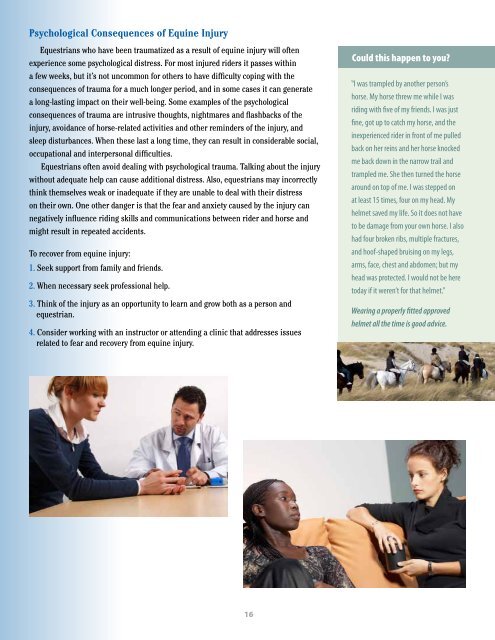Horse Related Injury Brochure - Alberta Equestrian Federation
Horse Related Injury Brochure - Alberta Equestrian Federation
Horse Related Injury Brochure - Alberta Equestrian Federation
You also want an ePaper? Increase the reach of your titles
YUMPU automatically turns print PDFs into web optimized ePapers that Google loves.
Psychological Consequences of Equine <strong>Injury</strong><br />
<strong>Equestrian</strong>s who have been traumatized as a result of equine injury will often<br />
experience some psychological distress. For most injured riders it passes within<br />
a few weeks, but it’s not uncommon for others to have difficulty coping with the<br />
consequences of trauma for a much longer period, and in some cases it can generate<br />
a long-lasting impact on their well-being. Some examples of the psychological<br />
consequences of trauma are intrusive thoughts, nightmares and flashbacks of the<br />
injury, avoidance of horse-related activities and other reminders of the injury, and<br />
sleep disturbances. When these last a long time, they can result in considerable social,<br />
occupational and interpersonal difficulties.<br />
<strong>Equestrian</strong>s often avoid dealing with psychological trauma. Talking about the injury<br />
without adequate help can cause additional distress. Also, equestrians may incorrectly<br />
think themselves weak or inadequate if they are unable to deal with their distress<br />
on their own. One other danger is that the fear and anxiety caused by the injury can<br />
negatively influence riding skills and communications between rider and horse and<br />
might result in repeated accidents.<br />
To recover from equine injury:<br />
1. Seek support from family and friends.<br />
2. When necessary seek professional help.<br />
3. Think of the injury as an opportunity to learn and grow both as a person and<br />
equestrian.<br />
4. Consider working with an instructor or attending a clinic that addresses issues<br />
related to fear and recovery from equine injury.<br />
Could this happen to you<br />
I was trampled by another person’s<br />
horse. My horse threw me while I was<br />
riding with five of my friends. I was just<br />
fine, got up to catch my horse, and the<br />
inexperienced rider in front of me pulled<br />
back on her reins and her horse knocked<br />
me back down in the narrow trail and<br />
trampled me. She then turned the horse<br />
around on top of me. I was stepped on<br />
at least 15 times, four on my head. My<br />
helmet saved my life. So it does not have<br />
to be damage from your own horse. I also<br />
had four broken ribs, multiple fractures,<br />
and hoof-shaped bruising on my legs,<br />
arms, face, chest and abdomen; but my<br />
head was protected. I would not be here<br />
today if it weren’t for that helmet.”<br />
Wearing a properly fitted approved<br />
helmet all the time is good advice.<br />
16


